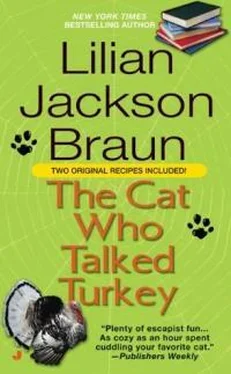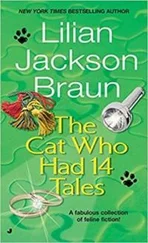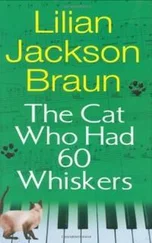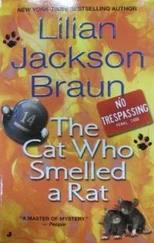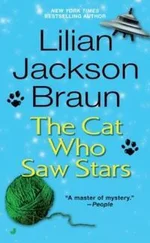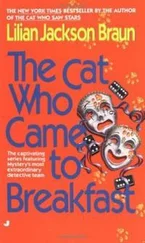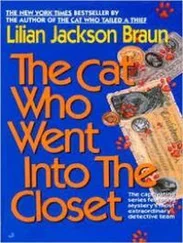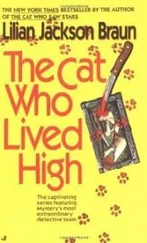He shook hands with the president of the local historical society, who begged him to speak at one of their meetings.
He even drank a cup of tea!
When it was over, he offered his arm and asked, “May I escort you to Ittibittiwassee, where all the best people live? That color you’re wearing looks especially good on you.”
“Thank you,” she said. “Lavender is my birthday color—November, you know.”
“Do you also have a birthday poem?”
“I never did until you wrote about the idea in your column. Now I’m going to adopt my husband’s favorite poem—Shakespeare’s thirtieth sonnet. Dell loved the last two lines!”
In the lobby of Ittibittiwassee Estates, he was hailed on all sides, thus adding to his acclaim as an important person.
When they arrived at the door of suite 400, Edythe gave him her keys. He unlocked it and pushed the door gently open. She walked in, and her knees buckled. Qwilleran caught her. Her face, which had regained its alabaster look at the dedication, turned gray again.
“Call the infirmary! Quick!” he said.
Medics arrived with a stretcher.
“I’ll go with her,” Susan said.
“Do you think I have her permission to call the police?”
“Absolutely!”
Only then did Qwilleran have time to assess the damage. The glass doors of the china cabinet were open, and all the miniature shoes—four shelves full—were gone. The only one remaining was on the floor, smashed.
Only the Meissen shoe on the bedside table was undisturbed.
Elsewhere, Qwilleran found Lish’s grungy duffel bag in a wastebasket. A closet door stood open, showing several small pieces of designer luggage, but no large fortnighter. That had been used to transport the loot . . . with towels? There were none in the bathroom and few in the linen closet. The porcelains could be layered between thicknesses of terry cloth.
Susan returned to the apartment. “The cardiologist is there. Are the police coming?”
“The sheriff is sending a deputy. He or she will want to know the number and value of the objects stolen.”
Susan said, “There’s a ledger in the desk drawer. Dr. Dell kept meticulous records. Edythe once told me it was almost ten thousand, and that was before inflation.”
Qwilleran said he’d stay until after the deputy’s visit. Susan said Dr. MacKenzie had ordered an ambulance from the hospital.
Qwilleran drove home via Indian Village to ensure that Polly had not drowned. She had just arrived, quite dry.
“I see you didn’t fall in,” he said. “How was it?”
“The boat ride was lovely, if you like boats. The company was congenial. The picnic lunch was superb. Janice gave me some crabmeat Roquefort sandwiches to take home. No crust. I don’t know whether you like that sort of tea-party fare.”
“Ask me!”
“We can have some celery sticks and iced tea and sit on the deck.”
He would have preferred iced coffee, but on a Fourth of July weekend, iced tea seemed more patriotic.
“Excuse me while I change into something comfortable.”
“Do you mind if I tune in the six-o’clock news?”
There were soccer scores . . . and a barn fire on Sandpit Road . . . and a fatal accident on Bixby Highway, south of the county line. A young woman driving south crossed the yellow line into the northbound lane and plowed head-on into the Bixby Airport bus. The victim had not been identified, but she was driving an out-of-state vehicle.
Polly came down the stairs from the balcony. “Did you hear that?” she demanded. “You’d expect that of an older woman having a heart attack.”
“She was calling her boyfriend on the cell phone,” Qwilleran said.
“Did your show go well today?”
“I wowed ’em! I’ll get you a ticket for next Sunday afternoon.”
“Did you attend the dedication, dear?”
“I was late for the presentation of the key, but I got there in time for the tea indoors. The cookies weren’t very good.”
There was more, but Qwilleran had to go home and feed the cats.
When Qwilleran drove into the barnyard, a furry blur in the kitchen window indicated that dinner was late. Both Koko and Yum Yum took supervisory posts on top of the bar while he arranged their food attractively on two plates, one serving larger than the other. In the midst of the chore the phone rang, and Qwilleran grabbed the handset on the wall, expecting a report from Susan.
It was Gary Pratt. “Qwill! Did you hear the six-o’clock news? Fatal accident on Bixby Highway. It was Lish Carroll!”
“How do you know?”
“A deputy I went to high school with came into the bar. We both knew her and thought she was a character.”
“How come she was driving? I thought she’d been denied a license.”
“Who knows? Nobody’s been able to figure her out since ninth grade. Well, I’ve got to get back to work. Thought you’d like to have the inside dirt.”
Qwilleran’s first reaction was: What happened to the porcelain shoes?
His second reaction was to phone Susan and tip her off about the accident. Edythe’s doctor might want to censor the news from reaching her bedside.
Susan had just arrived home from the hospital—exhausted. “I’ve been playing big sister to Edythe for twenty-four hours. I’ll call Dr. MacKenzie at once, about this new development. He calls her a brave woman. He wants her in the hospital for a week for observation. Edythe doesn’t mind; she says he’s charming. And he happens to be a widower.”
With that mission completed, Qwilleran fed the cats and prepared to satisfy his own ravenous hunger resulting from an emotional performance onstage. He started heating some beef barley soup from the deli and building a heroic ham sandwich on rye augmented by an equally heroic dill pickle.
He had no sooner turned off the burner under the soup than Koko staged a first-class tizzy. He hopped on and off the kitchen counter, pressing his nose against the window screen that overlooked the approach to the barnyard. Something important was arriving. The cat was perturbed enough to suggest that it was a fire truck or an army tank.
Qwilleran went outdoors to investigate, first covering the soup pot and hiding the sandwich in a cat-proof cabinet. When a vehicle came through the woods, one could always hear the motor and crunching of tires on crushed stone. There was none of that, but a lone walker came into view, trudging wearily through the woods. He was wearing boots, skinny jeans, a loose hip-length jacket, and shoulder-length hair. He was the remaining half of the Lish-and-Lush team.
SIXTEEN

Qwilleran went to meet the weary traveler. “Clarence! Where did you come from?”
“The camp,” the young man gasped, as if with his last breath.
“Great Oaks? That’s ten miles from here! I hope you were able to hitch a ride.” It was not likely; local drivers were not prone to pick up hitchhikers with haircuts different from their own.
“Have you had food, Clarence?”
The young man shook his head. “Couldn’t pay for any. She’s gone. Didn’t leave no money.”
“Well, come into the gazebo and have a bowl of soup and a ham sandwich.” He showed Clarence to a lounge chair. “Stretch out here. Take off your boots. Munch on these nuts while you’re waiting. Would you like some fruit juice?”
“Any beer?”
“Sorry. No beer.” There was beer—and everything else—in the bar, but Qwilleran preferred to keep the party dry.
In the barn he gave the soup another shot of heat and slipped another slice of ham into the sandwich. The cats watched—Yum Yum bemused, Koko mystified; the male cat always wanted to know the who, why, and what. Qwilleran was wondering how to break the news of the car accident. Lish was simply “gone,” as far as her driver knew . . . and how indeed could he hold a conversation with this man of few words?
Читать дальше
